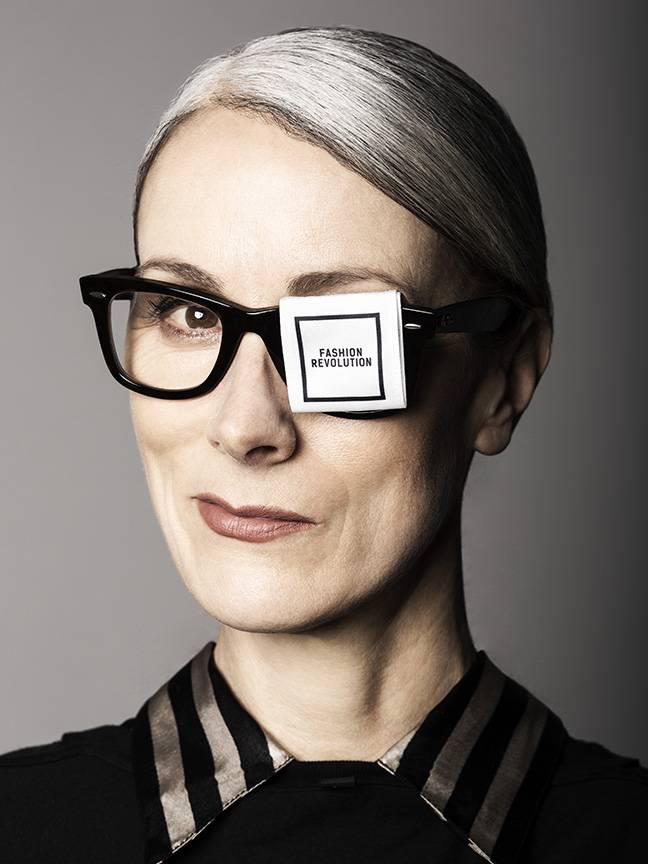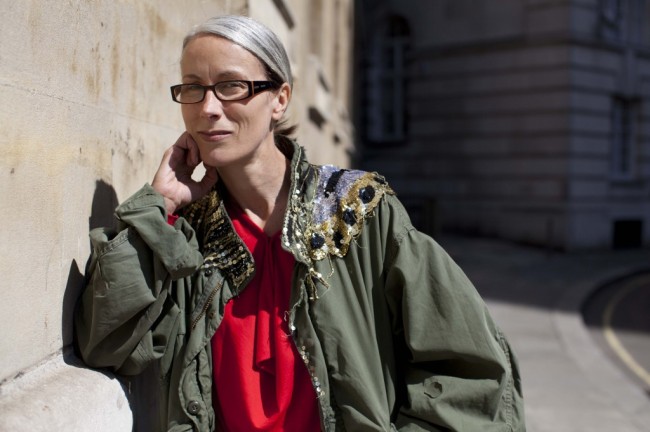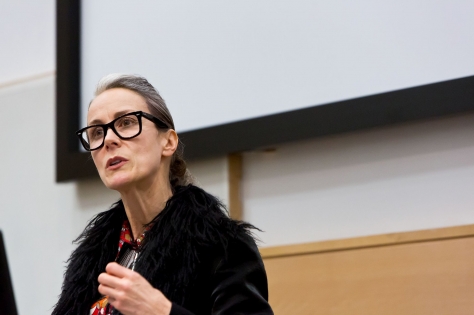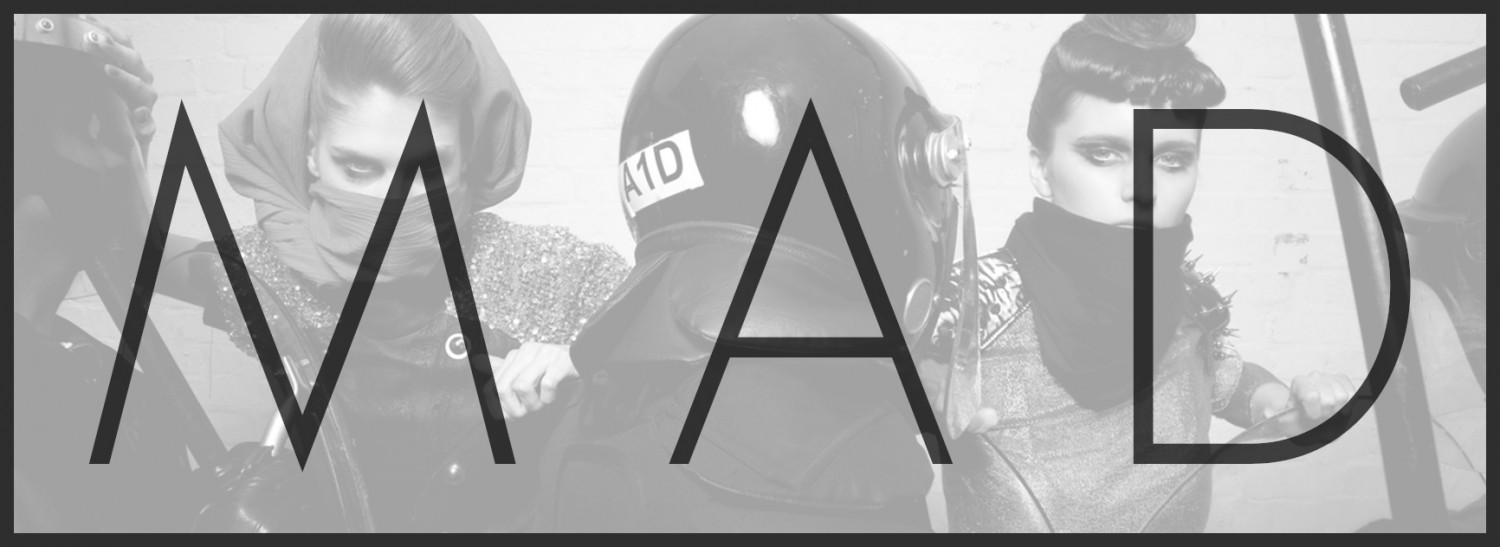
Caryn Franklin for Fashion Revolution (Image by Trevor Leighton)
Sometimes fashion lovers and fashion critics can coexist — even in the same body. Fashion activist Caryn Franklin opens up about her career, her passion, and the joy of dressing up.
Caryn Franklin, native Brit and self-proclaimed “Fashion Commentator and Agent of Change” is one of those people who wears too many hats to count. Now in her mid fifties, she’s worked over the past 30 years as a writer, director, producer, commentator, editor, scholar, and lecturer. Needless to say, the industry’s been well served by Ms. Franklin. Most publicly, she worked as fashion editor and co-editor at i-D Magazine from 1982 to 1988 and as a broadcaster on the BBC’s The Clothes Show, which were opportunities that allowed her to step into a more tolerant version of the industry just a few decades ago. Her mission is simple: to love fashion, and to improve the industry so that everyone else can do the same. She says, “I really believe in the beauty of diversity, the beauty of being an individual, in age, size, skin tone, and I always have. It’s just sort of innate in me. This industry gives us the tools we need to create change and to be more inclusive.”
As far as her career, she explains that, “It’s been a very long time. I’ve worked in the industry for 30 years and in the very, very early days when I was at i-D Magazine, we promoted all body types. That’s just what happened. And so that atmosphere was my introduction to fashion and it made total sense to me.” Perhaps reflexively at first, she stepped into a current that guided publications like i-D to showcase diverse faces. It was the same one that inspired brands like BodyMap to use mothers as models. Much of her work — her most powerful work — takes place behind the scenes. It happens out of the spotlight of editorial success and television presence — outside of book sales and higher degrees. It’s clear upon speaking to Caryn Franklin that her real passion lies in her work as admirer of fashion and an Agent of Change.
“Here’s how I see it. My clothes are signifiers around my identity, so I love thinking about how I’ll broadcast myself,” she says, tugging the sleeve of her striped Comme des Garcons tee. “I want every woman to love the image she sees in the mirror.” But as her career progressed, she began to feel a shift that put a damper on those ambitions. “At some point,” she explains, “I was kind of okay with the fact that models were aspirational, and that we were getting a least some diversity with Naomi [Campbell], Cindy Crawford, Yasmeen Ghauri. We were getting a womanly body shape. It wasn’t the emaciated, thin ideal we see today.” Although the birth of her passion was sort of indefinable, she’s able to identify the moment when the industry changed. “And then we had, you know, Kate Moss who earned a sort of supermodel moniker being called ‘The Waif,’ and people were excited that she was thin, and it just went on getting thinner and thinner.”

“You know, fashion does loads of things brilliantly and you can make anything look amazingly aspirational and very exciting.” – Caryn Franklin (Image by Safia Minney for HowToLookGood.com)
The shift not only struck a professional chord, but a personal one as well. She looks down into her lap for a bit, and in a moment of reflection, says, “I had a sister who had an eating disorder and was being approached to model all the time, and I began to realize as I worked in the media that we had a huge audience for the programs that we made.” At that point, she had to sit with the fact that a certain amount of responsibility goes along with working in fashion media. She says, “Fashion is highly influential, and I began to think about what it was actually transmitting.” Watching someone she loved being approached to work by the industry she loved on the basis of mental illness ignited Franklin’s fire. “I didn’t have the languaging then, you know. Looking back I would now say that it was an empathetic thing to do. An emotionally considerate thing to do. It was wrong as far as I was concerned.”
“Fashion is highly influential. and I began to think about what it was actually transmitting.”
From that moment forward, she allowed that fire to guide her down a more productive path. “I began to feel really uncomfortable about it, this new body ideal, and I convinced the BBC that we should make a documentary that was asking, really, about our accountability as an industry to our consumers.” And off she went. Never one to shirk at the heavy stuff, Caryn Franklin saw that the industry needed a wake-up call and she sounded her alarm. “Ever since then, I’ve spoken about it a lot because fashion isn’t comfortable,” she explains. “People within fashion aren’t comfortable speaking about these issues but I’ve never had a problem.” Tucking a bit of grey hair behind her ear, she reiterates, “ No, I definitely don’t have a problem critiquing it. Someone should.”
Let it be known that she’s not messing around. Since 1994, Caryn’s worked with organisations like Fashion Revolution and the Diversity Now initiative. She proposed and is now an ambassador of the London College of Fashion’s Centre for Sustainable Fashion. Her labor of love, though, is the website-turned-movement All Walks Beyond the Catwalk which she co-created alongside Debra Bourne and Erin O’Connor in 2009. “I’d just gotten angry by that point,” she says, “and I thought, ‘I’m going to leave fashion in 10 years’ time in a worse state than I found it,’ and so I would rather make a big noise now and see if we can change things. So we created All Walks Beyond the Catwalk to challenge the fashion industry’s dependence on this body ideal.” But make no mistake. She’s quick to point out that fashion activism isn’t exactly glamorous. “Ultimately this is charity work, a volunteer activity from the heart. We’ve all made ourselves ill. We’ve all questioned why we’re doing this to ourselves.”
Out of that exhaustion comes progress, and the progress Caryn Franklin has seen as a result of her, Bourne, and O’Connor’s collective work is enough to keep them pressing on. Thankfully, she’s recruited a team of dedicated volunteers who share her vision. Thinking a bit about her All Walks crew, she says, “We have a team of 14 volunteers who all go, ‘Yep, I’m going to agree to do this really boring job regularly because I want to aid in the process.’” They aren’t there for glamour. They don’t need to be sent out on assignments with Nick Knight to keep working toward change. She continues, “The really boring jobs, they’re the fundamental building bricks in something that begins to look like a palace. But if you’re not taking bricks from point A to point B, you can’t build a palace.” She pauses a minute and shuffles in her chair. “I rather like the analogy of the palace,” she laughs.
Reflecting back on her career, Caryn had to learn a few important lessons on her feet. “I found that I just couldn’t really exist in a high fashion environment,” she adds. “I found that I wasn’t comfortable with the practice, and since I’d worked on these big BBC-type productions for so many years,” she adds. “I found that I had a stronger mainstream voice, which meant I could deliver these messages to an audience that was keen to self esteem and taking fashion in on your own terms. That just isn’t possible in a high fashion setting.”
Personal development played just as large a role in this pursuit. In a candid moment, she explains that this passion for body image activism isn’t just industry deep. “When I was only in my twenties, I watched as my first daughter’s father went into a really rapid physical decline,” she recalls. “He succumbed to a battle with multiple sclerosis, and even though I watched it all unfold and did what I could, ultimately when someone is dying, there’s not much you can do. It was a huge learning curve for me to recognize that a body, any body that supports you, that breathes for you, that walks the planet for you is not to be undermined.”
For Caryn, a body is not simply a clothes hanger or a bunch of slender limbs reaching out from glossy magazine pages. Representation of a body, especially in fashion, has an impact. It has an impact on the ways in which that body is perceived not just by consumers of media but by itself in the mirror at night. As a mother of two girls, she finds that this learning curve is not something that just affects her work and gets left in the office at five o’clock each night. It forms the basis upon which her two daughters are raised. She encourages them to think about and revere their bodies as the vessels that, as they grow, will walk the planet for them, too. “I just want them to grow up in a world that doesn’t try so hard to appropriate how they feel about their bodies,” she says. “What mother doesn’t, really?”

Franklin speaks at annual Department of Apparel Conference (Image via Manchester Metropolitan University)
Though she is well on her professional way, there’s a whole new generation springing up to populate a changing industry. So where do we go from here, we aspiring Agents of Change? “You have to lead,” she says, looking defiant. “Nobody is going to come offer you an opportunity for change. Nobody is going to make it nice and easy and invite you on a comfortable journey.” She’s quick to point out that, “if you’re signing up for any kind of activism, you have to engage with your own conviction and see where it takes you.” Franklin urges emerging activists and creatives to have an opinion. From her point of view, “Your generation has got no excuse for lethargy. No excuse to say, ‘Well, there’s just no point.’ There’s every point.”
“Any body that supports you, that breathes for you, that walks the planet for you is not to be undermined.”
On the other end, though, she wants us to have as much fun as she’s having. When asked about the rosier side of her fashion love affair, it’s like she physically lights up, her glasses riding up on the apples of her cheeks. If you’re looking for someone to tell you if you’re wearing the right shoes this season, Ms. Franklin is not your girl. “One of the things that high street fashion’s done is appropriated our desire to dress up and celebrate who we are…This trend promotion of, ‘This is the look you’ve gotta get, and you better get it right,’ or, ‘Did Angelina Jolie really wear the right shoes here?’ Who cares?” She throws her hands up, “It’s all just complete madness, you know. Another piece of madness.”
Here’s the type of advice you’ll get from Caryn Franklin. “Just have fun! Get dressed up and let it go. Step out the door and embrace life.” Sounds like a plan. Clearly excited about the topic, she muses a bit. “And really, I think that’s fashion’s gift to me. I don’t have to take notice of the promotion, so I can engage with it on my own terms as I like. And surely that’s what it’s there for.”
Always looking forward to her next project, she says, “It’s important for women to be engaged and embolden themselves with fashion. I think that’s one thing women my age lose if they’re not.” She laughs, “You know, when I’m 80, I’ll be redesigning what old age looks like. That’s fun for me, really, and I hope it’s helpful to others in some way. And I guess that’s what keeps me powering on, because you really can do yourself in trying to change the world.”




